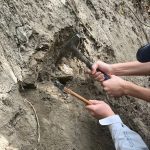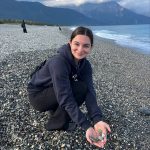Students Gain Fieldwork Experience Studying Geohazards in Taiwan
This winter, 10 UConn students traveled to Taiwan for a three-week Earth science field course, learning alongside local students and experiencing the country’s unique geology, geography and culture firsthand.
The course Winter Geoscience and Geohazards in Taiwan, led by Tim Byrne, professor of Earth sciences, gives students across multiple disciplines the chance to conduct fieldwork—learning everything from field mapping to data collection and synthesis—while gaining a new cultural perspective.
Byrne, who has led the course every other year for the past decade, says Taiwan’s unique geological features, including its tectonic activity and susceptibility to geohazards, make it an ideal destination to explore the course’s concepts
“It’s incredibly active with erosion and climate,” Byrne says. “The Taiwanese people are all sensitive to this. It’s great to have students go from Connecticut, where there is very little risk of natural disasters, to a country that lives with them every day.”
Byrne describes the trip as an immersive learning experience, mixing informal lectures, field trips to active volcanos and recent earthquake sites, museum tours, conversations with experts, and visits to picturesque beaches surrounded by palm trees and uplifted coral reefs. In one activity, students measured structural and stratigraphic sections of varying types of sedimentary rocks to better understand the natural setting of oil and gas production.

The UConn cohort was joined by students from National Taiwan University throughout the trip.
Dezani Fields ’25 (CLAS), a geographic information science major, says he learned a lot about topics he was previously curious about, including sustainable mining practices.
This was the first time Fields had traveled alone, and he says exchanging knowledge and perspectives with local Taiwanese students gave him new insight into topics he might pursue after graduation.
“It was my own experience,” Fields says. “It helps to try new things and understand that there’s a lot I don’t know and want to learn.”
Violet Andrews ’26 (ED), an Earth sciences education major, first learned about the education abroad opportunity in one of Byrne’s classes last year. Initially unsure due to her limited experience in Earth sciences, she says Byrne encouraged her to apply—a decision she now appreciates as she considers adding a second major in the field.

As an aspiring teacher, she says the trip not only allowed her to learn about the way education is approached in Taiwan but also highlighted the value of cultural exchange in the learning process—a concept she hopes to incorporate into her lesson plans moving forward.
“Neag’s biggest thing is expanding your global perspective and bringing a global perspective into your classroom,” Andrews says. “That’s kind of hard to do if you’ve only ever been in the U.S.”
She says while college does a good job of expanding a student’s humanity and global understanding, they could only get those experiences by going out and exploring for themselves.
Andrews says she found it fascinating to see what interested different students the most. She says the group’s diverse academic interests helped them learn about things they might not have typically considered. As a future educator, she found the experience especially important.
Both Fields and Andrews agree that fieldwork was much different than simply learning in a classroom. For Fields, it provided a clearer picture of what it might be like to work in a research role.
Andrews, who still plans to become a teacher, says the trip sparked a new interest in pursuing Earth science internships to gain more hands-on experience.
“The more knowledge I gain, the more it will benefit me and my students in the future,” she says.
Latest UConn Today
- UConn Health Recognized Among America’s Best Large Employers for 2025 by ForbesAmong the 701 best companies in America, UConn Health ranked 150th and placed second among seven Connecticut organizations.
- Parents Can Soon Use QR Codes to Reveal Heavy Metal Content in Baby FoodIt’s impossible to eliminate heavy metals from baby food entirely, but testing can help consumers make informed decisions
- A Message from President MaricAn update on the University’s budget and request for state support in the next two fiscal years
- Hartford, Stamford Campuses Open ‘Innovate Labs’ Where Technology, Fun, and New Skills ConnectInnovate Labs is part of the Digital Frontiers Initiative (DFI) at the School of Business. The program bridges academia and industry through cutting-edge research, innovation, and partnerships.
- What to Know About Pneumonia as Pope Francis Is HospitalizedUConn Health experts say vaccinations – not just pneumococcal – are key to avoiding serious illness
- UConn Firsts: The First Black StudentIn 1914, Alan Thacker Busby quietly made history when he became the first Black student to enroll at the school that today is the University of Connecticut













